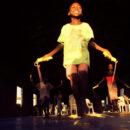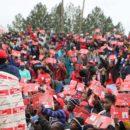Vernacular Politics in Africa (3)
This is part three of a five part expansive critical review of Jean-Franí§ois Bayart, The State in Africa: The Politics of the Belly (2009), focusing on the moral dimensions of African governance””in the sense of how ethics and legitimacy are adduced in support of political practice.

As well as the acquisition of resources, Bayart also applies the concept of extraversion to the “moral economy”, through the institutions which formed the ethical foundations of colonial society, namely the school, hospital, trading post, public administration, and mission. These institutions created the salaried class that came to control the state, setting in motion their primitive accumulation through the formal and informal powers associated with office and salary. But colonization was simultaneously a “total defeat”, which on the one hand inspired widespread practices of deception, and on the other prompted efforts to recapture indigenous ethics of “dignity”. The parallel success of these two projects””each of them a component of the “grammar of extraversion”””led to the ambiguities of flag independence. We see the same drama being played out in current-day abrogations of sovereignty, as manifest by policy conditionalities for loans and grants, peacekeeping missions, humanitarian operations, and the ICC. African political elites draw upon external moralities for both international and domestic legitimation, while also subject to the grammar of locally-rooted socio-political ethics.
In the northern Sudanese case, the mission and trading post were absent, and the administration was a mix of civil institutions (dominated by the riverain subalterns) and tribal authority. The central issue for contestation was the courts, a secondary one was education. The various post-colonial projects of political Islam were precisely efforts to (re-)create a system of indigenous political ethics that could assert the dignity””the word is important””of the nation. It is a theme that dominates vernacular political philosophies. For example, the tensions between colonial and indigenous concepts of dignity, as played out in the divided judiciary, are the central theme of Abdullahi Ibrahim’s Manichaean Delirium. A comparable story could be told for the colonial era schools.
An untold dimension to the “dignity” of the late pre-colonial states was slavery. The Fur and Funj states were founded on slavery and the Egyptian conquest consisted in significant part of expanding the slaving frontier. The legitimacy enjoyed by these exercises in governmentality was tied in precisely to the legalized inequality among human beings it entailed, defined less as the selective extension of rights as opposed to commoditization of persons, and more as inclusion or exclusion in lineages and a Muslim community. Recourse to these histories as the basis for validating a contemporary restoration of sovereignty is at best a divisive exercise, symbolized by the failure of Sudanese to rally around national dates (such as national independence) or figures (such as Ismail al Azhari or Omar al Bashir), all of which have ambiguous resonance among citizens. Efforts to abolish slave ownership, entailing the criminalization of the subaltern trading-military class, helped ignite the Mahdist revolt, celebrated by a powerful section of Sudanese society as the nation’s “first independence”. A trajectory in which European condemnations of criminality rebound on the originators has this precedent in Sudan, reminding us that one person’s terrorist or war criminal is another’s liberation hero.
Those sections of the peoples who have suffered under such government by discrimination have thought differently. In post-colonial Sudan, the more the northern elites have sought legitimacy in the symbols of Islam and their common (northern) cultural identity, the louder has been the southern call for separation. Sudan still seeks common legitimizing national narrative and unifying national symbols.
Darfur shares with a handful of African polities the fact that it possesses a deeper historical hold over the people who live there, than the modern state which encompasses it. Anyone who has lived in Darfur can attest to the fact that there is a strong sense of Darfurian identity that is as strong as or stronger than ethnic allegiance or national Sudanese citizenship. We should not be surprised: for at least three of the last four centuries, and possibly twice as long, the region’s politics have been primarily “Darfurian.” But Darfur’s “total defeats” of 1874 and 1916 have not subsequently been overcome by a restoration of a specifically Darfurian dignity. This was not achieved in Sudanese national independence in 1956 (with its ambiguous orientation towards Egypt and “Arab” identity) nor in the Islamist revolution of 1989 (with its betrayed promise of emancipation through common faith), nor in the SLA-JEM insurrection of 2003-04 (with its spectacular leadership failures).
The Darfurian sense of collective self has yet to recover from the decapitation of the Fur political class in 1916″”a double defeat in that British imperial occupation also left Darfur orphaned in a domestic political hierarchy controlled by the subaltern class drawn from the Nile Valley. The resonance of the term ibada, commonly translated as “genocide” but carrying equal implication of “uprooting” or “clearing”, among the Fur, reflects the Fur elite’s fear that the devastation of 2003-04 spells the terminal rupture of this historic positioning. The subsequent failure of the Fur political leaders to seize the opportunities presented by international solidarity to make a positive political claim on the Sudanese state, indicates a political dead end. The Fur are in danger of writing themselves out of the Sudanese political process, defining themselves principally as victims of human rights abuses, rather than as political agents.
As currently framed, any resolution of the Darfur crisis demands recognition of the irreducible demand for Darfurian dignity. In turn this demands a symbolic victory for the people who see themselves as the deprived center of the region, namely the Fur. However, the dimensions of this dignity are not agreed: there are both tactical and substantive political disputes. For many among the Fur elites, a restored single region headed by a Fur is a sine qua non, and the allocation of a vice presidential post for Darfur is a close second. For others, dignity is to be achieved when their recent suffering is validated through the arrest of President Bashir and the successful completion of international agendas for humanitarianism and human rights.
Compared to the agenda of prosecuting the president or sustaining a Kosovo-style intervention force, the domestic power-sharing demands are both easier to meet and more likely to result in durable political settlement. For some Darfurians, the international moral grammar is merely a tactical asset to be utilized in support of domestic political reconfiguration. For others it is more substantive, holding out the promise of an alternative channel and route for external legitimation and support for a state or quasi-state in Darfur.
Either approach will reproduce many of the existing characteristics of governance. In Darfur as much as in the case of Khartoum and the variants of political Islam that have dominated nationalist claims, lineage is not legitimacy: the historicity of Darfurian governance is neither unproblematic nor uncontested. For example, central to the Fur claim for a just peace is the restoration of the hakura land tenure system, re-interpreted in a historically erroneous way as “tribal land ownership.” The establishment of any such system of ethnically-homogenous cantons (historically unprecedented) might settle a central political demand of the Fur leadership, but would generate other political problems perhaps no less severe, notably opposition from Darfur’s Arabs. It might also jeopardize the status of Darfurians as residents of central Sudan, should the principle of ethnically-defined residence rights spread throughout the country.
Meanwhile, the ethical foundations of global governance””the human rights conditions on aid, the demand for an end to impunity for crimes under international law, humanitarian principles for international agencies operations in crisis””similarly ignite tension over indigenous values of dignity. The moral claims made against international agencies””the Sophie’s Ark scandal in Chad being one example””reveal much about the unease with which African countries extend hospitality to western charities. The resources are welcome, the moral advertisements less so. Sudanese vernacular discourse around the promised/threatened international protection force for Darfur, and the ICC indictment of the President, centers on the offense against the dignity of the nation, or the claim that any such dignity has been forfeited anyway. Personalizing the issue around the individual of the current president of Sudan and his alleged intentions and character leads to an exaggerated version of Sudan’s existing patrimonial political logic, and emphasizing the necessity of external political agency similarly exaggerates the tendency to extraversion. Sudanese have a long history of simultaneously accommodating and resisting such external intrusions along with their associated moral claims, and the responses to the ICC and other western pressures are best interpreted in this light, as a new chapter in a familiar story of extraversion and co-option.







One of the manifestations of today’s political stagnation in Sudan is that some members of the Sudanese counter-elite including so-called intellectuals have adopted a political project that consists solely in tearing down the status quo, without any positive efforts to construct an alternative national political economic project. There is almost no substance behind the rhetoric of democracy and the “New Sudan” project has all-but-vanished. In terms of objective outcomes, this adds up to little more than affirmation of the success of the Islamist government’s project of redefining the Sudanese national project as identical with their own Islamist project. When political opposition is ready to resort to destroying the legitimacy or even the very existence of the state itself in the service of undermining its current rulers, it is no more than an exercise in nihilism. In addition if the opposition is ready to take extraversion to its logical conclusion of requesting foreign forces to dictate the political structure of a future dispensation, this leaves the current regime as the sole custodians of national dignity as described by Bayart. How long do we have to cry in the wilderness to point out that this cannot, now or ever, be the way ahead?